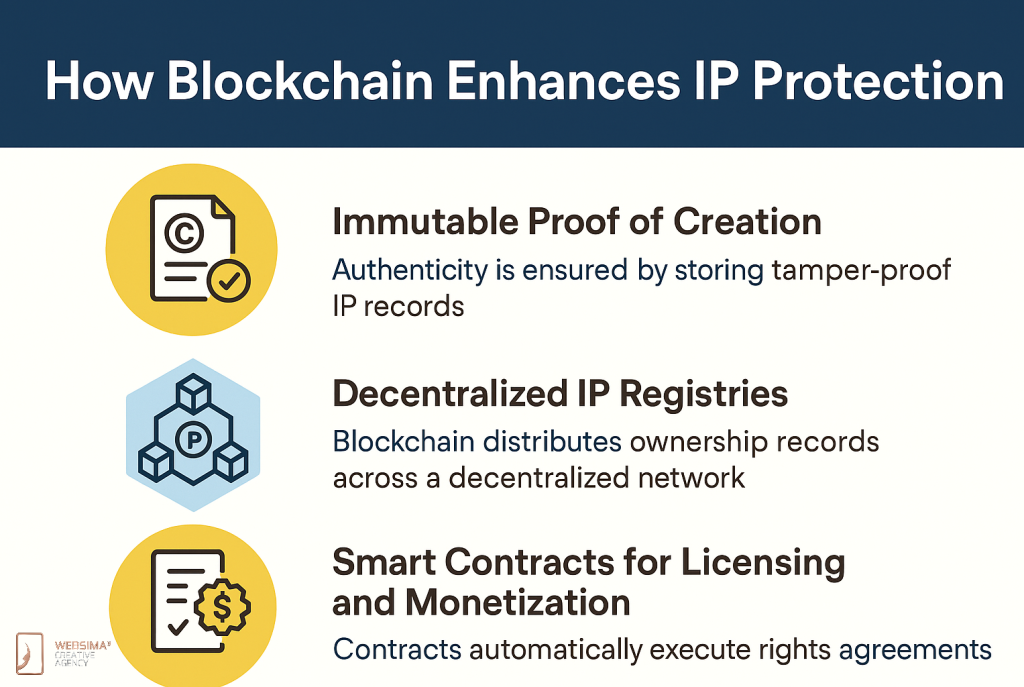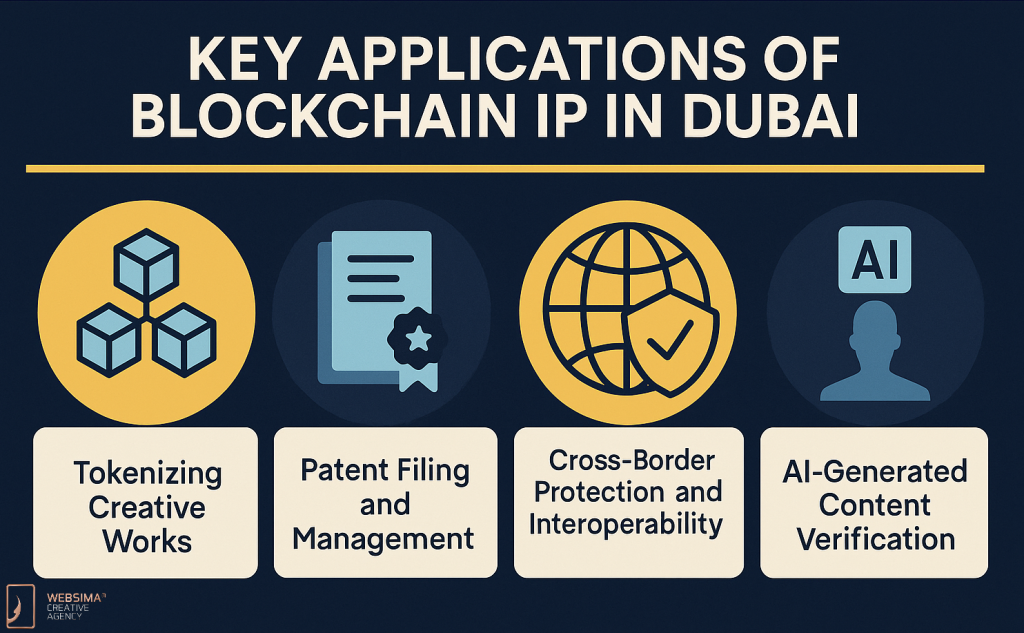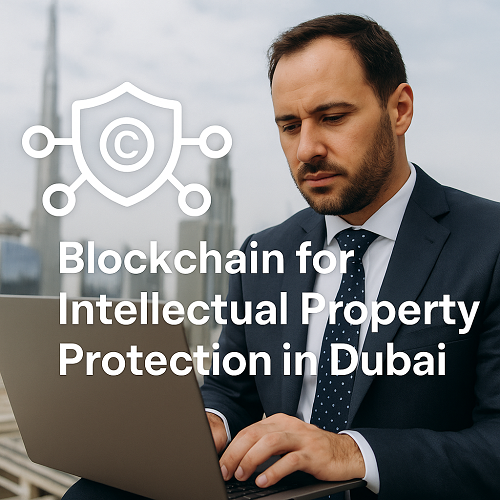In a city driven by innovation, digital transformation, and creative entrepreneurship, protecting intellectual property (IP) is more critical than ever. Dubai’s rise as a regional hub for startups, tech, design, and content creation has placed IP at the forefront of legal and commercial discourse. However, the conventional IP protection process—centralized, jurisdiction-bound, and often slow—struggles to keep pace with the rapid digitization of ideas and content. That’s where blockchain technology steps in.
Blockchain intellectual property Dubai is no longer a conceptual idea—it is a fast-growing framework to secure digital ownership, prevent infringement, and streamline rights management and make Dubai ideal for Blockchain as a Service (BaaS) companies. As Dubai continues its journey toward becoming the global capital of the digital economy, blockchain-based IP solutions are forming the backbone of trust in its creative and commercial sectors.
Introducing RWL: Real World Law Onchain @StoryProtocol. Powered by @getauthorship & @verio_story, our two-agent AI framework revolutionizes how legal disputes are settled onchain—efficiently, affordably, and most importantly, binding under law. The future of IP protection is here pic.twitter.com/VhCC6SUNdC
— T.Z. (@XuanzhenZ) January 20, 2025
Why Intellectual Property Matters in Dubai’s Economy
Dubai’s Knowledge and Innovation Strategy
Dubai’s economy is evolving from oil and trade to technology, design, and content. The emirate has launched various initiatives under the UAE National Innovation Strategy and Dubai Creative Economy Strategy, aiming to make Dubai the global capital of creative industries by 2025.
This has led to a surge in startups, artists, engineers, software developers, and content creators. With so much innovation underway, the need to safeguard patents, copyrights, designs, and trademarks has become urgent.
Weaknesses in Traditional IP Systems
Current IP protection systems rely heavily on centralized databases and legal registries. This means:
- Limited interoperability across jurisdictions
- Long registration and verification timelines
- Vulnerability to document tampering or loss
- Difficulty in enforcing rights across digital borders
Blockchain offers a solution by creating immutable, time-stamped, and decentralized proof of ownership.
How Blockchain Enhances IP Protection
Immutable Proof of Creation
One of the core strengths of blockchain is its ability to record information in a way that is unalterable. When a designer, author, or developer registers their work on a blockchain, they create an immutable timestamped record proving ownership from the moment of creation. This can serve as legal evidence in infringement cases.

This makes Blockchain intellectual property Dubai especially useful for:
- Patent applications
- Music and media copyrights
- Fashion and design registrations
- Software and code repositories
- NFT-based art and creative assets
Decentralized IP Registries
Blockchain can serve as a global registry for IP rights, allowing creators in Dubai to register and manage their intellectual assets independent of traditional institutions. Platforms such as WIPO’s Blockchain Task Force are already exploring decentralized IP systems with cross-border validity.
With Dubai’s open attitude toward Web3 and digital governance, these registries can be integrated into city-wide services to automate IP protection and reduce disputes.
Smart Contracts for Licensing and Monetization
Blockchain doesn’t stop at proving ownership—it can automate licensing and royalty payments through smart contracts. These programmable agreements enable creators to define usage rights and receive royalties instantly when their content is used.
In Dubai’s fast-growing digital media and metaverse industries, this provides a seamless way for creators to monetize IP without relying on intermediaries.
Key Applications of Blockchain IP in Dubai

1. Tokenizing Creative Works
Artists, musicians, filmmakers, and digital designers in Dubai can mint their creations as NFTs—each representing a unique IP. These NFTs serve not only as tradable assets but also as on-chain records of authorship, provenance, and licensing terms.
Dubai’s burgeoning NFT scene in areas like digital fashion, real estate, and virtual art galleries is already driving this adoption.
2. Patent Filing and Management
Tech startups and R&D firms can register innovations on private or public blockchains to create a digital trail of their development timeline. This is especially important in competitive industries like fintech, biotech, and AI, where patent timing is crucial.
A blockchain-backed proof of innovation provides instant evidence of who created what—and when.
3. Cross-Border Protection and Interoperability
Dubai’s global business ecosystem requires IP protection that extends across multiple jurisdictions. Blockchain-based registries can be accessed and verified from anywhere in the world, solving one of the key limitations of traditional IP enforcement.
This benefits international investors, joint ventures, and Dubai Free Zone companies exporting IP-intensive goods or services.
4. AI-Generated Content Verification
With the rise of AI-generated images, music, and text, verifying original authorship becomes challenging. Blockchain can log AI training data, authorship claims, and usage licenses—bringing transparency to a previously ambiguous field.
This use case aligns with Dubai’s Smart Government goals and AI regulatory exploration.
Government and Legal Backing in Dubai
UAE’s Embrace of Blockchain for Governance
The UAE’s Emirates Blockchain Strategy 2021 aimed to transfer 50% of government transactions to blockchain. In Dubai, this is already being applied in areas like land registry, health data, and supply chains. Extending this to IP is a natural progression.
Dubai Courts and DIFC are also exploring the use of blockchain for document notarization and contract verification, which further supports IP claims.
Legal Recognition of Digital Assets
The UAE has been updating its legal framework to recognize digital tokens, smart contracts, and blockchain-based documentation. These reforms make Blockchain intellectual property Dubai legally enforceable—critical for resolving disputes over copyrights and patents.
Challenges to Blockchain-Based IP Implementation
Legal Harmonization
For blockchain-based IP to be globally effective, harmonized regulations across jurisdictions are required. This includes:
- Recognizing blockchain timestamps as legal evidence
- Defining how NFT-based IP is treated under copyright law
- Establishing cross-border enforcement protocols
Dubai is already part of global regulatory conversations, but more alignment is needed.
Education and Adoption
Many creators and startups are still unaware of how blockchain can protect their IP. Without user-friendly tools and education campaigns, adoption may remain limited. Public-private partnerships, incubators, and educational institutions must play a role in bridging this gap.
Integration with Existing IP Systems
Blockchain systems must be interoperable with current registries at the DED, Ministry of Economy, and Free Zone authorities. Seamless API integration and data syncing are required to make hybrid systems viable.
Emerging Platforms and Dubai-Based Initiatives
Several platforms and companies are already working on blockchain-based IP protection relevant to Dubai:
- Verisart: Certifies digital art and IP on the blockchain with timestamped metadata.
- Po.et: Designed for publishers and content creators to timestamp and manage rights.
- UAE-based startups: Web3 companies in DIFC Innovation Hub and DMCC Crypto Centre are experimenting with NFT-based content protection.
Dubai’s Creative Economy Strategy provides funding and acceleration support for such ventures, making them one of the top blockchain business models thriving in Dubai.
The Future of IP in Dubai’s Web3 Economy
As Dubai advances toward a metaverse-integrated and tokenized economy, IP protection will become even more complex and vital. Blockchain will likely form the foundation of:
- NFT-backed trademarks and patents
- AI-authorship verification tools
- Licensing marketplaces with real-time royalty disbursements
- DAO-based content governance models
- IP wrapped into soulbound tokens for professional identity
With smart contracts managing creator rights and NFTs representing legal ownership, Dubai’s IP landscape will become faster, more secure, and globally portable.
Conclusion
In an era where digital content is created and distributed at the speed of light, traditional IP protection is no longer enough. Blockchain intellectual property Dubai represents a foundational shift—offering creators, startups, and innovators a more secure, transparent, and automated way to protect their ideas.
By leveraging decentralized registries, NFTs, and smart contracts, Dubai is transforming how IP is managed—locally and globally. As legal frameworks evolve and platforms mature, blockchain will be at the core of the emirate’s IP strategy.
Build Blockchain-Based IP Solutions with Websima
At Websima, we empower creators, startups, and enterprises to build IP-protection systems rooted in blockchain technology. Whether you want to tokenize creative content, automate licensing with smart contracts, or integrate NFT-based registries into your business model—we’re here to deliver.
Our blockchain development solutions include:
- IP timestamping and verification platforms
- NFT minting and copyright authentication
- Smart contract-based licensing systems
- Blockchain registry integration for government and enterprise
- Legal and compliance advisory for UAE’s digital IP framework
Let’s future-proof your intellectual property with blockchain.
Talk to our experts at Websima and secure your creative assets in Dubai’s fast-evolving digital economy.





